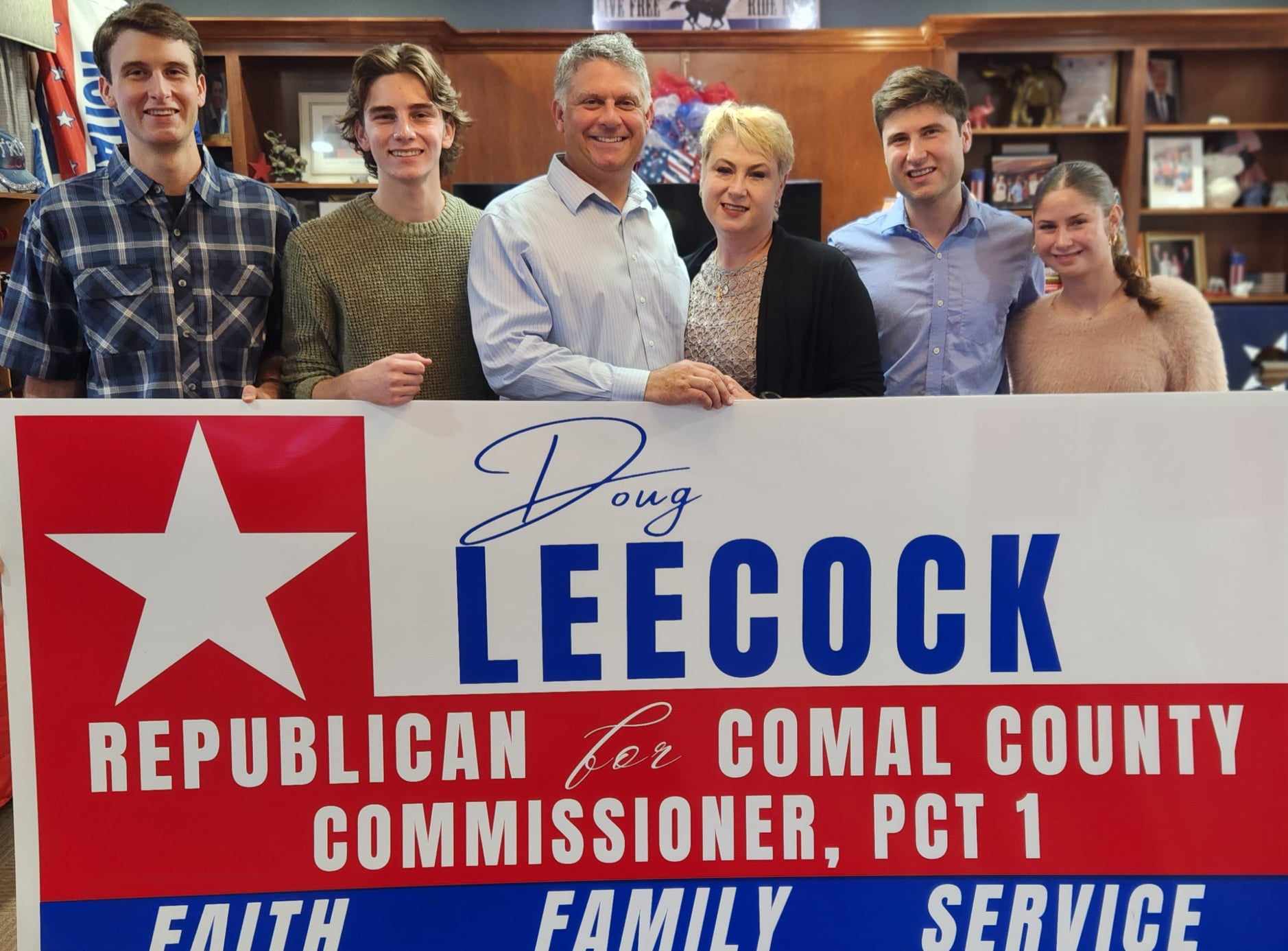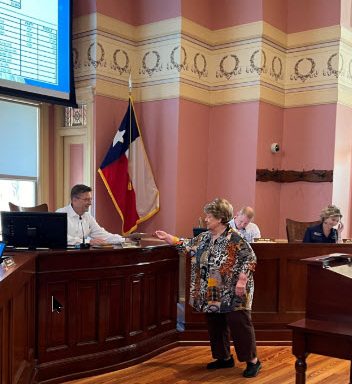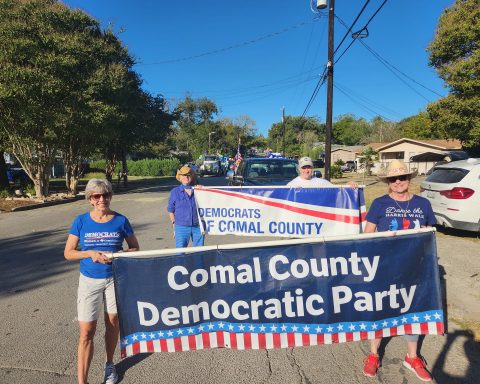In 2021 Comal County Precinct 1 Commissioner Donna Eccleston enraged her Canyon Lake constituents by asking the Commissioners Court to strike the words “free public access” and “free public use” for boat ramps from a 1994 interlocal agreement with the U.S. Army Corps of Engineers (USACE).
The proposed motion was meant to update old language and align Comal County’s contract with USACE with those of other counties managing easements leased from the federal government, she said in an Aug. 11, 2021 interview with MyCanyonLake.com.
Residents read between those lines.
They flooded subsequent Commissioners Court meetings to protest Eccleston’s proposal for changing the way the county runs its nine public boat ramps, which provide free access to Canyon Lake.
Doug Leecock, a Republican who owns a house on the south side of Canyon Lake, was one of the people who kept coming back. Today he’s the public face of a community stakeholder group formed in the wake of the controversy, the Canyon Lake Boat Ramps Community Alliance (CLBRCA).
He enjoyed his first taste of public service so much he’s running in the March 5 Joint Primary Election to replace Eccleston, who is not seeking reelection. He faces New Braunfels resident Joyce Yannuzzi, a fellow Republican who serves as district director for Texas State Sen. Donna Campbell, R-25.
Julie Sanders is on the ballot as their Democratic contender.
“Boat ramps got me started,” Leecock said. “Getting involved in the county and the community seemed like a natural progression.”
It hasn’t escaped his notice that except for Precinct 4 Commissioner Jen Crownover, everyone else on the court hails from New Braunfels.
“The county should have representation that has a perspective of that of the south side of the lake,” he said.
Getting involved with boat ramps provided him with a good overview of how county government works.
The CLBRCA learned how to collaborate with County Judge Sherman Krause to identify and assess possible solutions to the many problems at the county’s nine antiquated boat ramps, Leecock said.
The ramps were built in the 1960s and 70s to serve residents of tiny subdivisions then springing up around the lake, not to accommodate thousands of visitors who flock to the ramps daily during busy summer months.
The association spent hundreds of hours developing a community survey that allowed Krause to hone in on major problems including ramp congestion, ramp safety, parking, access for boaters/non-boaters, rules and enforcement, infrastructure, maintenance and trash cleanup, and restrooms.
Leecock said it took hundreds more hours to develop viable solutions.
In the process, he learned of the delicate dance required to bring other powerful stakeholders to the table including elected officials, the Guadalupe-Blanco River Authority or GBRA (which makes the rules about swimming at boat ramps), and the Water Oriented Recreation District of Canyon Lake (WORD).
The key to solving big problems is starting with the little ones.
“If you don’t have micro-improvements, for example, stripes, spaces, and signage and clear laws about what is enforceable at each ramp then you can’t take it to the next level,” Leecock said. “The next level is how can we control the amount of people trying to access the water via the boat ramps.”
Charging a small fee for visitors whose cars are not registered in Comal County might be a way to raise additional funds for boat-ramp maintenance and take the burden off of Comal taxpayers, he said.
CLBRCA’s efforts appeared to have paid off in February 2022 when Krause finally released a draft of the Comal County Boat Ramps Operation Plan.
Two years later the plan still hasn’t been formalized. The county has authorized significant upgrades at several boat ramps but also has chipped away at the $1 million in American Rescue Plan Act (ARPA) funds originally earmarked for boat ramps.
The county allocated $150,000 to spend on boat ramps this year.
Leecock appears unperturbed and undeterred by the glacially slow progress of the court, and will only say he’s not at liberty to discuss anything further as an announcement by Krause appears imminent.
He’s learned that working with stakeholders big and small is part of a commissioner’s job, he said.
“You’re the lead point of contact to the people that you are serving. On one small scale, it’s your precinct but on the broader scale, it’s all the people of Comal County. You’re serving the community and being the local representative to create local solutions to local problems. It’s the job.”
But the job of being a county commissioner doesn’t come with any meaningful power or ability to alleviate the rapid growth that’s bulldozing beautiful Hill Country land into hellish lunar landscapes and crowding thousands of houses on the smallest possible lot sizes, draining the already stressed Trinity and Edwards aquifers in the process.
Leecock said the Texas legislature has zero interest in giving counties any control over that development, so commissioners should at least lead by example.
“If you are going to talk about water conservation as a county the county should do things to show it’s willing to take the lead on that,” he said. “The state does have control of things but I think we can work with nonprofits, other organizations, and individuals to be better conservationists and share details that landowners might not understand. There’s a big push from the Comal County Conservation Alliance (CCCA) and the Hill Country Alliance (HCA) to share with landowners how to share conservation easements.”
Improving communication between the county and the developers also could alleviate the tension inherent between all parties, he said.
Larry Hull, president of the Comal Trinity Groundwater Conservation District, thinks Leecock would be pretty good at it.
“Doug is focused on helping each of us,” he said. “He understands the impact of rapid growth in Comal County and he will energize all of us in working together to find ways to mitigate the impact of growth, particularly on our water supply.”
As for the infamous Vulcan Quarry project Leecock, who serves as Outreach Committee chair for the CCCA, said he’s not sure which is worse, allowing an out-of-state corporation to turn a former ranch into a 1,500-acre open-pit limestone quarry or watching a developer raze the landscape to build 1,000 homes.
“If I could wave my magic wand the landowners signed it over as a conservancy and different conservation groups wrote a check to keep that space available,” he said.
Leecock also takes issue with locals and visitors alike who think it’s ok to break the rules at parks and boat ramps, vandalize and litter the area, and be oblivious to commonsense safety measures like wearing life jackets and boating responsibly.
Canyon Lake exists primarily to supply water to the citizens of Comal County and provide flood control of the Guadalupe River, which runs through a geographic area also known as “flash-flood alley.”
Fishing, boating and camping are optional.
“It’s time for us to get our act together,” he said. “…this is technically the USACE’s lake from 940 (feet) down. We have to work more closely with them and make sure we’re being good stewards of this body of water.”
A staunch Catholic, Leecock said sees himself as a servant of the people of Canyon Lake who pushes for solutions at the granular level.
Over the last several years he’s involved himself with other community initiatives including serving as a Knight of Columbus at St. Thomas the Apostle Catholic Church, volunteering his time as outreach committee chair for the Comal County Conservation Alliance, working with Comal County Friends of the Night Sky, serving as vice president of the Canyon Lake Noon Lions, and volunteering with the Comal ISD Education Foundation.
Last week he was endorsed by the New Braunfels Young Republicans, who said “We know that Doug is going to go down as one of the greatest commissioners in Comal County history and we are so proud to be a small part of his story.”
“He’s very compassionate about what he does, I noticed that,” said Bob Pessia with St. Thomas’s Knights of Columbus. “He’s eager to help and always looking to improve stuff.”
Debbie England, who owns an auto repair shop in Canyon Lake and runs the popular Everything Canyon Lake TX Facebook page, said Precinct 1 needs everything Leecock “brings to the table.”
“Doug is a committed, dedicated resident of our precinct with a servant’s heart,” she said in an email. “Doug has proven himself to myself and many, many others with his selfless dedication to bettering our quality of living. Doug is approachable, hands-on, and available. Doug’s willingness to actually be involved, get his hands dirty and jump in where needed to help is a proven fact. Candidate Leecock’s campaign slogan is faith, family, service. Those aren’t just words. Those are how he lives his life.”
Leecock is semi-retired from a career in operations management in the retail and healthcare industries. He headed his San Antonio neighborhood’s homeowners association for 17 years.
Wife Dr. Michele Cerny-Leecock is a board-certified OB/GYN with a busy practice in San Antonio, and the decision was made years ago to promote her husband to “CEO” of the Leecock household to raise the couple’s four children.
The oldest, Jacob, is now 25 followed by Jonathan, 21, Christopher, 19, and Annemarie, 15.
In 2017 the Leecocks purchased a second home in Canyon Lake and gradually remodeled it.
“I knew this was where I wanted to be,” Leecock said. “I love the small-town feel.”
He now lives in Canyon Lake full time but the beautiful view of the lake he enjoys from his kitchen window also provides a ringside seat to drownings, near-drownings, accidents, traffic nightmares, overcrowding, and the general insanity that results from not having enough law enforcement to manage crowds.
Like a lot of other people in Canyon Lake, he’s picked up his share of dirty diapers and beer cans along the shoreline.
“People come here because it’s a great place to come visit,” he said. “We should try to do our best to make sure it stays that way.”




